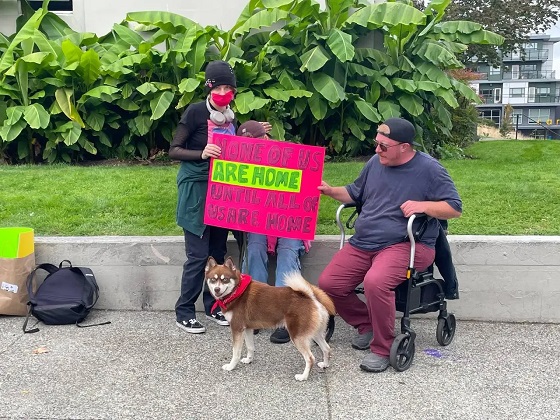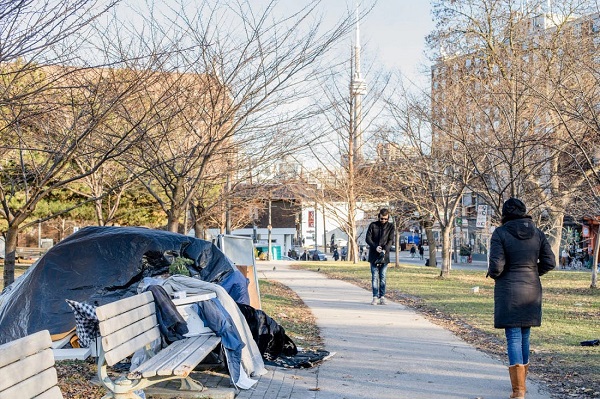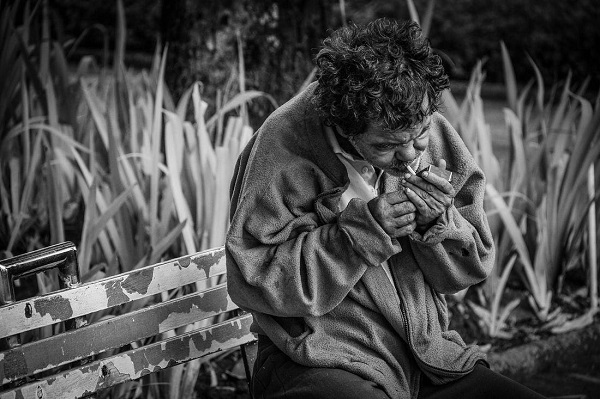Addictions
A city divided: Homelessness and drug crisis fuel tensions in Nanaimo


By Alexandra Keeler
Nanaimo, a city of approximately 100,000 situated on the eastern coast of Vancouver Island, has become a focal point in B.C.’s drug crisis. Already this year, the city has lost 68 residents to drug-related deaths.
This summer, the Nanaimo Area Public Safety Association urged city residents to come forward with information about assaults on the city’s homeless population.
The volunteer-led residents’ association was investigating claims that motorists were throwing objects at people experiencing homelessness, according to association director Collen Middleton.
“It’s not that I don’t want to believe that it’s happening — because I believe it. But there’s no evidence,” Middleton said. “It’s most likely the outreach workers, other homeless individuals or people in the street drug community with access to vehicles, like drug runners.”
These alleged assaults on homeless individuals — and the controversy surrounding them — are reflective of a broader crisis in the B.C. community.
Nanaimo, a city of approximately 100,000 situated on the eastern coast of Vancouver Island, has become a focal point in B.C.’s drug crisis. Already this year, the city has lost 68 residents to drug-related deaths. That represents five per cent of all opioid deaths in the province, despite the city being home to just two per cent of its population.
The city’s drug issues are exacerbated by a deepening housing crisis, which is the result of a shortage of shelter beds, growing homeless population and closure of support services — all of which are fueling tensions in the community.
‘Speak up’
Middleton, who moved with his family to South Nanaimo from Calgary in July 2021, says he was shocked by all the issues he saw in his neighbourhood. “Within a month we had somebody overdose and die on the other side of our garage,” he said.
Middleton found drug paraphernalia — such as needles and dime bags with drug residue — in his kids’ play area in their own backyard.
A break-in — where $5,000 worth of items were stolen from his garage — finally prompted Middleton to take action. He joined the local Facebook group Thieving Nanaimo, which has 25,000 members, and the board of the Nanaimo Area Public Safety Association.
In February, the association published a 52-page report detailing various incidents in the community, including theft, fires and property damage.
These incidents include regular break-ins and thefts at downtown businesses such as Fitz Ave Lingerie & Accessories Boutique, Red Shelf Decor and Fascinating Rhythm.
Fitz Ave Lingerie eventually installed 15 cameras and an alarm system that immediately notifies police of new incidents. It also keeps Naloxone kits on site to address drug use and overdoses in the store’s fitting rooms.
In 2023, community residents also raised concerns over the operation of an unsanctioned, “peer-supervised” drug consumption site on Nicol Street, which was run by the Nanaimo Network of Drug Users. The city labeled the property a “nuisance” but imposed no penalties. The site was ultimately shut down by its operators, who blamed the community. The operators faced no consequences for the nuisance designation, says Middleton.
“If the public didn’t speak up … I think we’d be in worse shape today,” said Middleton.
Subscribe for free to get BTN’s latest news and analysis, or donate to our journalism fund.
‘Bureaucratic hoops’
Mike Raey, a Nanaimo resident who has been intermittently homeless for the past two years, says the city is “not set up to help people who actually want the help.”
Raey, who struggles with alcohol addiction, currently stays in a shelter and keeps his belongings in a friend’s nearby tent.
Access to basic amenities like food storage are crucial for people trying to recover from addiction and stay healthy, he says. He is critical of the bureaucratic “hoops” that unhoused individuals face when seeking housing assistance.
“They have all these empty buildings — utilize them,” he said. “If they’re not up to code, bring them up to code.”
But, in some respects, the city seems to be moving in the opposite direction.
In August, it closed the Social Centre at 290 Bastion Street, a drop-in site that provided food, survival gear and a safe space to the unhoused and people struggling with addiction.
A frontline harm-reduction worker in Nanaimo, whom Canadian Affairs agreed not to name given the person’s concerns it could compromise future funding arrangements, says the centre was closed due to a lack of funding and resources to properly staff and operate the centre.
“I’ve watched service after service shut down, bed after bed,” said Benjamin Quinn, a trans Nanaimo resident who struggles with mental health issues and housing precarity. “The last holdout … was the Social Centre.”
On Sept. 3, Quinn and his nieces gathered outside Nanaimo’s city hall to protest the closure of the Social Centre and other essential services.
In an interview with Canadian Affairs, Nanaimo Mayor Leonard Krog highlighted the financial constraints the city faces addressing issues of homelessness and addiction.
“Those are fundamental, essential provincial responsibilities,” Krog said. “We work pursuant to a memorandum with BC Housing,” he said, referring to the Crown corporation responsible for developing and administering subsidized housing in the province.
A January 2024 Memorandum of Understanding between the City of Nanaimo and B.C. government includes a commitment to create 100 new temporary housing spaces in the city.
On June 28, BC Housing announced that city-owned land at 1030 Old Victoria Road would become the site of a new Nanaimo Navigation Centre. This modular building will feature approximately 60 private sleeping units for homeless individuals who have successfully stayed in shelters.
The project was narrowly approved by Nanaimo City Council in a 5-4 vote. Some councillors and community residents opposed it, citing concerns about inadequate mechanisms for fostering communication and accountability between housing operators and the community.
Krog says he supports the housing-first strategy in general, but believes certain housing solutions give rise to their own problems.
“People destroy [houses] because some individuals need secure, involuntary care,” he said. “They attract drug dealers and create environments of violence, mayhem and human trafficking. They become a different kind of hellhole.”
“You need to deal with the hardest first,” he said. “They’re never going to wake up one morning and say, ‘Oh, gee, I want to go to detox and get healthy.’ It’s not going to happen.”
Both the BC NDP and BC Conservative Party, which are competing for voter support in the upcoming election, have pledged to introduce involuntary care for people with severe addiction and mental health issues, Canadian Affairs reported last week.
The Nanimo Navigation Centre is slated to open in Spring 2025, alongside 78 supportive homes at a former Travellers Lodge hotel in Nanaimo, which has been leased by the B.C. government.
In the meantime, only 15 per cent of Nanaimo’s homeless population have somewhere to sleep at night. The city currently has 76 emergency shelter beds in total, while a 2023 survey found there were at least 515 homeless individuals — a 19 per cent increase from 2020 and nearly 200 per cent increase from 2016.
Krog insists the shortage of emergency shelters cannot be resolved at the municipal level. “We are helping, and we’ve put some money in,” he said. “But we don’t collect income tax.”
This article was produced through the Breaking Needles Fellowship Program, which provided a grant to Canadian Affairs, a digital media outlet, to fund journalism exploring addiction and crime in Canada. Articles produced through the Fellowship are co-published by Break The Needle and Canadian Affairs.
Subscribe to Break The Needle. Our content is always free – but if you want to help us commission more high-quality journalism, consider getting a voluntary paid subscription.
Addictions
Canada must make public order a priority again

A Toronto park
Public disorder has cities crying out for help. The solution cannot simply be to expand our public institutions’ crisis services
[This editorial was originally published by Canadian Affairs and has been republished with permission]
This week, Canada’s largest public transit system, the Toronto Transit Commission, announced it would be stationing crisis worker teams directly on subway platforms to improve public safety.
Last week, Canada’s largest library, the Toronto Public Library, announced it would be increasing the number of branches that offer crisis and social support services. This builds on a 2023 pilot project between the library and Toronto’s Gerstein Crisis Centre to service people experiencing mental health, substance abuse and other issues.
The move “only made sense,” Amanda French, the manager of social development at Toronto Public Library, told CBC.
Does it, though?
Over the past decade, public institutions — our libraries, parks, transit systems, hospitals and city centres — have steadily increased the resources they devote to servicing the homeless, mentally ill and drug addicted. In many cases, this has come at the expense of serving the groups these spaces were intended to serve.
For some communities, it is all becoming too much.
Recently, some cities have taken the extraordinary step of calling states of emergency over the public disorder in their communities. This September, both Barrie, Ont. and Smithers, B.C. did so, citing the public disorder caused by open drug use, encampments, theft and violence.
In June, Williams Lake, B.C., did the same. It was planning to “bring in an 11 p.m. curfew and was exploring involuntary detention when the province directed an expert task force to enter the city,” The Globe and Mail reported last week.
These cries for help — which Canadian Affairs has also reported on in Toronto, Ottawa and Nanaimo — must be taken seriously. The solution cannot simply be more of the same — to further expand public institutions’ crisis services while neglecting their core purposes and clientele.
Canada must make public order a priority again.
Without public order, Canadians will increasingly cease to patronize the public institutions that make communities welcoming and vibrant. Businesses will increasingly close up shop in city centres. This will accelerate community decline, creating a vicious downward spiral.
We do not pretend to have the answers for how best to restore public order while also addressing the very real needs of individuals struggling with homelessness, mental illness and addiction.
But we can offer a few observations.
First, Canadians must be willing to critically examine our policies.
Harm-reduction policies — which correlate with the rise of public disorder — should be at the top of the list.
The aim of these policies is to reduce the harms associated with drug use, such as overdose or infection. They were intended to be introduced alongside investments in other social supports, such as recovery.
But unlike Portugal, which prioritized treatment alongside harm reduction, Canada failed to make these investments. For this and other reasons, many experts now say our harm-reduction policies are not working.
“Many of my addiction medicine colleagues have stopped prescribing ‘safe supply’ hydromorphone to their patients because of the high rates of diversion … and lack of efficacy in stabilizing the substance use disorder (sometimes worsening it),” Dr. Launette Rieb, a clinical associate professor at the University of British Columbia and addiction medicine specialist recently told Canadian Affairs.
Yet, despite such damning claims, some Canadians remain closed to the possibility that these policies may need to change. Worse, some foster a climate that penalizes dissent.
“Many doctors who initially supported ‘safe supply’ no longer provide it but do not wish to talk about it publicly for fear of reprisals,” Rieb said.
Second, Canadians must look abroad — well beyond the United States — for policy alternatives.
As The Globe and Mail reported in August, Canada and the U.S. have been far harder hit by the drug crisis than European countries.
The article points to a host of potential factors, spanning everything from doctors’ prescribing practices to drug trade flows to drug laws and enforcement.
For example, unlike Canada, most of Europe has not legalized cannabis, the article says. European countries also enforce their drug laws more rigorously.
“According to the UN, Europe arrests, prosecutes and convicts people for drug-related offences at a much higher rate than that of the Americas,” it says.
Addiction treatment rates also vary.
“According to the latest data from the UN, 28 per cent of people with drug use disorders in Europe received treatment. In contrast, only 9 per cent of those with drug use disorders in the Americas received treatment.”
And then there is harm reduction. No other country went “whole hog” on harm reduction the way Canada did, one professor told The Globe.
If we want public order, we should look to the countries that are orderly and identify what makes them different — in a good way.
There is no shame in copying good policies. There should be shame in sticking with failed ones due to ideology.
Our content is always free – but if you want to help us commission more high-quality journalism,
consider getting a voluntary paid subscription.
Addictions
No, Addicts Shouldn’t Make Drug Policy

By Adam Zivo
Canada’s policy of deferring to the “leadership” of drug users has proved predictably disastrous. The United States should take heed.
[This article was originally published in City Journal, a public policy magazine and website published by the Manhattan Institute for Policy Research]
Progressive “harm reduction” advocates have insisted for decades that active users should take a central role in crafting drug policy. While this belief is profoundly reckless—akin to letting drunk drivers set traffic laws—it is now entrenched in many left-leaning jurisdictions. The harms and absurdities of the position cannot be understated.
While the harm-reduction movement is best known for championing public-health interventions that supposedly minimize the negative effects of drug use, it also has a “social justice” component. In this context, harm reduction tries to redefine addicts as a persecuted minority and illicit drug use as a human right.
This campaign traces its roots to the 1980s and early 1990s, when “queer” activists, desperate to reduce the spread of HIV, began operating underground needle exchanges to curb infections among drug users. These exchanges and similar efforts allowed some more extreme LGBTQ groups to form close bonds with addicts and drug-reform advocates. Together, they normalized the concept of harm reduction, such that, within a few years, needle exchanges would become officially sanctioned public-health interventions.
The alliance between these more radical gay rights advocates and harm-reduction proponents proved enduring. Drug addiction remained linked to HIV, and both groups shared a deep hostility to the police, capitalism, and society’s “moralizing” forces.
In the 1990s, harm-reduction proponents imitated the LGBTQ community’s advocacy tactics. They realized that addicts would have greater political capital if they were considered a persecuted minority group, which could legitimize their demands for extensive accommodations and legal protections under human rights laws. Harm reductionists thus argued that addiction was a kind of disability, and that, like the disabled, active users were victims of social exclusion who should be given a leading role in crafting drug policy.
These arguments were not entirely specious. Addiction can reasonably be considered a mental and physical disability because illicit drugs hijack users’ brains and bodies. But being disabled doesn’t necessarily mean that one is part of a persecuted group, much less that one should be given control over public policy.
More fundamentally, advocates were wrong to argue that the stigma associated with drug addiction was senseless persecution. In fact, it was a reasonable response to anti-social behavior. Drug addiction severely impairs a person’s judgement, often making him a threat to himself and others. Someone who is constantly high and must rob others to fuel his habit is a self-evident danger to society.
Despite these obvious pitfalls, portraying drug addicts as a persecuted minority group became increasingly popular in the 2000s, thanks to several North American AIDS organizations that pivoted to addiction work after the HIV epidemic subsided.
In 2005, the Canadian HIV/AIDS Legal Network published a report titled “Nothing about us without us.” (The nonprofit joined other groups in publishing an international version in 2008.) The 2005 report included a “manifesto” written by Canadian drug users, who complained that they were “among the most vilified and demonized groups in society” and demanded that policymakers respect their “expertise and professionalism in addressing drug use.”
The international report argued that addiction qualified as a disability under international human rights treaties, and called on governments to “enact anti-discrimination or protective laws to reduce human rights violations based on dependence to drugs.” It further advised that drug users be heavily involved in addiction-related policy and decision-making bodies; that addict-led organizations be established and amply funded; and that “community-based organizations . . . increase involvement of people who use drugs at all levels of the organization.”
While the international report suggested that addicts could serve as effective policymakers, it also presented them as incapable of basic professionalism. In a list of “do’s and don’ts,” the authors counseled potential employers to pay addicts in cash and not to pass judgment if the money were spent on drugs. They also encouraged policymakers to hold meetings “in a low-key setting or in a setting where users already hang out,” and to avoid scheduling meetings at “9 a.m., or on welfare cheque issue day.” In cases where addicts must travel for policy-related work, the report recommended policymakers provide “access to sterile injecting equipment” and “advice from a local person who uses drugs.”
The international report further asserted that if an organization’s employees—even those who are former drug users—were bothered by the presence of addicts, then management should refer those employees to counselling at the organization’s expense. “Under no circumstances should [drug addicts] be reprimanded, singled out or made to feel responsible in any way for the triggering responses of others,” stressed the authors.
Reflecting the document’s general hostility to recovery, the international report emphasized that former drug addicts “can never replace involvement of active users” in public policy work, because people in recovery “may be somewhat disconnected from the community they seek to represent, may have other priorities than active users, may sometimes even have different and conflicting agenda, and may find it difficult to be around people who currently use drugs.”
Subscribe for free to get BTN’s latest news and analysis – or donate to our investigative journalism fund.
The messaging in these reports proved highly influential throughout the 2000s and 2010s. In Canada, federal and provincial human rights legislation expanded to protect active addicts on the basis of disability. Reformers in the United States mirrored Canadian activists’ appeals to addicts’ “lived experience,” albeit with less success. For now, American anti-discrimination protections only extend to people who have a history of addiction but who are not actively using drugs.
The harm reduction movement reached its zenith in the early 2020s, after the Covid-19 pandemic swept the world and instigated a global spike in addiction. During this period, North American drug-reform activists again promoted the importance of treating addicts like public-health experts.
Canada was at the forefront of this push. For example, the Canadian Association of People Who Use Drugs released its “Hear Us, See Us, Respect Us” report in 2021, which recommended that organizations “deliberately choose to normalize the culture of drug use” and pay addicts $25-50 per hour. The authors stressed that employers should pay addicts “under the table” in cash to avoid jeopardizing access to government benefits.
These ideas had a profound impact on Canadian drug policy. Throughout the country, public health officials pushed for radical pro-drug experiments, including giving away free heroin-strength opioids without supervision, simply because addicts told researchers that doing so would be helpful. In 2024, British Columbia’s top doctor even called for the legalization of all illicit drugs (“non-medical safer supply”) primarily on the basis of addict testimonials, with almost no other supporting evidence.
For Canadian policymakers, deferring to the “lived experiences” and “leadership” of drug users meant giving addicts almost everything they asked for. The results were predictably disastrous: crime, public disorder, overdoses, and program fraud skyrocketed. Things have been less dire in the United States, where the harm reduction movement is much weaker. But Americans should be vigilant and ensure that this ideology does not flower in their own backyard.
Subscribe to Break The Needle.
Our content is always free – but if you want to help us commission more high-quality journalism,
consider getting a voluntary paid subscription.
-

 Business2 days ago
Business2 days agoThe Grocery Greed Myth
-

 Business2 days ago
Business2 days agoCarney government plans to muddy the fiscal waters in upcoming budget
-

 Frontier Centre for Public Policy15 hours ago
Frontier Centre for Public Policy15 hours agoCanada’s Democracy Is Running On Fumes
-

 Business2 days ago
Business2 days agoTax filing announcement shows consultation was a sham
-

 Education15 hours ago
Education15 hours agoClassroom Size Isn’t The Real Issue
-

 Business16 hours ago
Business16 hours agoYour $350 Grocery Question: Gouging or Economics?
-

 Media15 hours ago
Media15 hours agoResponse to any budget sleight of hand will determine which audience media have decided to serve
-

 International9 hours ago
International9 hours agoMelania Trump quietly reunites children divided by Ukraine war







